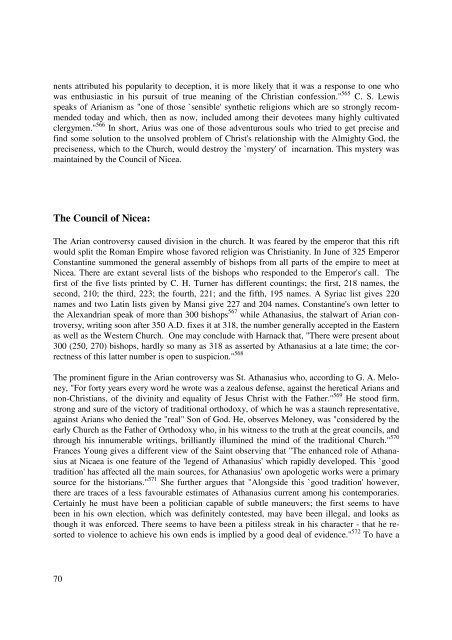Scripture and God in Christianity
Scripture and God in Christianity
Scripture and God in Christianity
You also want an ePaper? Increase the reach of your titles
YUMPU automatically turns print PDFs into web optimized ePapers that Google loves.
nents attributed his popularity to deception, it is more likely that it was a response to one who<br />
was enthusiastic <strong>in</strong> his pursuit of true mean<strong>in</strong>g of the Christian confession." 565 C. S. Lewis<br />
speaks of Arianism as "one of those `sensible' synthetic religions which are so strongly recommended<br />
today <strong>and</strong> which, then as now, <strong>in</strong>cluded among their devotees many highly cultivated<br />
clergymen." 566 In short, Arius was one of those adventurous souls who tried to get precise <strong>and</strong><br />
f<strong>in</strong>d some solution to the unsolved problem of Christ's relationship with the Almighty <strong>God</strong>, the<br />
preciseness, which to the Church, would destroy the `mystery' of <strong>in</strong>carnation. This mystery was<br />
ma<strong>in</strong>ta<strong>in</strong>ed by the Council of Nicea.<br />
The Council of Nicea:<br />
The Arian controversy caused division <strong>in</strong> the church. It was feared by the emperor that this rift<br />
would split the Roman Empire whose favored religion was <strong>Christianity</strong>. In June of 325 Emperor<br />
Constant<strong>in</strong>e summoned the general assembly of bishops from all parts of the empire to meet at<br />
Nicea. There are extant several lists of the bishops who responded to the Emperor's call. The<br />
first of the five lists pr<strong>in</strong>ted by C. H. Turner has different count<strong>in</strong>gs; the first, 218 names, the<br />
second, 210; the third, 223; the fourth, 221; <strong>and</strong> the fifth, 195 names. A Syriac list gives 220<br />
names <strong>and</strong> two Lat<strong>in</strong> lists given by Mansi give 227 <strong>and</strong> 204 names. Constant<strong>in</strong>e's own letter to<br />
the Alex<strong>and</strong>rian speak of more than 300 bishops 567 while Athanasius, the stalwart of Arian controversy,<br />
writ<strong>in</strong>g soon after 350 A.D. fixes it at 318, the number generally accepted <strong>in</strong> the Eastern<br />
as well as the Western Church. One may conclude with Harnack that, "There were present about<br />
300 (250, 270) bishops, hardly so many as 318 as asserted by Athanasius at a late time; the correctness<br />
of this latter number is open to suspicion." 568<br />
The prom<strong>in</strong>ent figure <strong>in</strong> the Arian controversy was St. Athanasius who, accord<strong>in</strong>g to G. A. Meloney,<br />
"For forty years every word he wrote was a zealous defense, aga<strong>in</strong>st the heretical Arians <strong>and</strong><br />
non-Christians, of the div<strong>in</strong>ity <strong>and</strong> equality of Jesus Christ with the Father." 569 He stood firm,<br />
strong <strong>and</strong> sure of the victory of traditional orthodoxy, of which he was a staunch representative,<br />
aga<strong>in</strong>st Arians who denied the "real" Son of <strong>God</strong>. He, observes Meloney, was "considered by the<br />
early Church as the Father of Orthodoxy who, <strong>in</strong> his witness to the truth at the great councils, <strong>and</strong><br />
through his <strong>in</strong>numerable writ<strong>in</strong>gs, brilliantly illum<strong>in</strong>ed the m<strong>in</strong>d of the traditional Church." 570<br />
Frances Young gives a different view of the Sa<strong>in</strong>t observ<strong>in</strong>g that "The enhanced role of Athanasius<br />
at Nicaea is one feature of the 'legend of Athanasius' which rapidly developed. This `good<br />
tradition' has affected all the ma<strong>in</strong> sources, for Athanasius' own apologetic works were a primary<br />
source for the historians." 571 She further argues that "Alongside this `good tradition' however,<br />
there are traces of a less favourable estimates of Athanasius current among his contemporaries.<br />
Certa<strong>in</strong>ly he must have been a politician capable of subtle maneuvers; the first seems to have<br />
been <strong>in</strong> his own election, which was def<strong>in</strong>itely contested, may have been illegal, <strong>and</strong> looks as<br />
though it was enforced. There seems to have been a pitiless streak <strong>in</strong> his character - that he resorted<br />
to violence to achieve his own ends is implied by a good deal of evidence." 572 To have a<br />
70
















